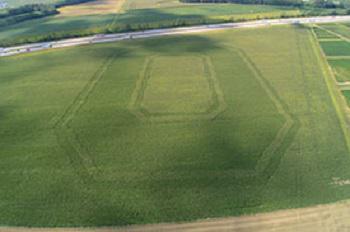When viewed from the sky, a cornfield west of Columbus, Ohio, demonstrates Buckeye pride with an unmistakable Block "O" pattern.
The demonstration plot's design should not merit consideration as a crop circle or a corn maze. It was made recently thanks to new dual-hybrid planting technology that researchers at Ohio State University (OSU) have been putting under the microscope.
"In general, farmers have always managed their acreage on a per-field basis, depending on their soil characteristics and other production factors," John Fulton, precision agriculture specialist for Ohio State University Extension, said. "Now, 2015 is the first year technology is commercially available to farmers that allows the planting of two different hybrids in the same field."
OSU Extension is the outreach arm of the College of Food, Agricultural and Environmental Sciences.
Examples of the technology include the Kinze 4900 series planter and Precision Planting's vSet Select, Fulton said.
"With this new precision technology, we can match more productive ground with a racehorse, or offensive type of hybrid, which would maximize yields in a year with good weather and the proper management. On other areas of the field, you might want to place a more risk-averse, or defensive, hybrid that would still produce favorable yields, even during adverse growing seasons," Fulton said.
Fulton helps lead an OSU Extension effort examining the technology for corn and soybeans on hundreds of acres throughout Ohio, both at OSU's agricultural research stations and through on-farm research with collaborating farmers.
The Block "O" is located on Field 5, just south of Interstate 70, on Ohio State's Molly Caren Agricultural Center in London, Ohio, home to the college's annual Farm Science Review, which is Sept. 22-24 this year, with up to 140,000 attendees expected.
The hybrids for Field 5 were chosen for effect, Fulton said. Most of the corn planted there has a traditional golden-colored tassel. The Block "O" hybrid has a purple tassel. A Case IH planter fitted with Precision Planting multi-hybrid seed meters was used to seed the field.
"It definitely has a cool factor to it," Fulton said. "But basically, it's a good opportunity to demonstrate the capability of new technology and start engaging growers and educating them about aspects they need to consider when adopting new technology. And, from our perspective, we want to understand its functionality and, when requested, help companies improve the technology."
Fulton said researchers have just begun to receive feedback about the technology from farmers this year.
"We are at the very early stages to determine where the value exists for the farmer," Fulton said. "The industry is reporting that this technology could provide a $40 or $50 gain per acre in corn. We don't have economic data available, so we are focused on providing farmers the background and information about the technology before they decide to invest, or if they have already invested, we want to have recommendations for how best to use it."
Plans are to continue the evaluation effort into next year to gain further insight and production data to report back to farmers, Fulton said.
To keep updated on the project, contact Fulton at fulton.20@osu.edu or follow the project on the Department of Food, Agricultural and Biological Engineering's precision agriculture website at fabe.osu.edu/precisionag.
The Farm Science Review is sponsored by the college and features educational workshops, presentations, demonstrations and educational opportunities delivered by experts from OSU Extension and the Ohio Agricultural Research and Development Center - the college's research arm.
Participants can peruse 4,000 product lines from 620 commercial exhibitors and capitalize on educational opportunities from specialists from OSU and Purdue University.
Advance tickets are $7 at all OSU Extension county offices, many local agribusinesses and online at fsr.osu.edu/visitors/tickets. Tickets are $10 at the gate. Children 5 and younger are admitted free.
Hours are 8 a.m. to 5 p.m. Sept. 22-23 and 8 a.m. to 4 p.m. Sept. 24.
Ohio crop circle promotes precision agriculture -- not E.T.'s favorite team




 Alerts Sign-up
Alerts Sign-up